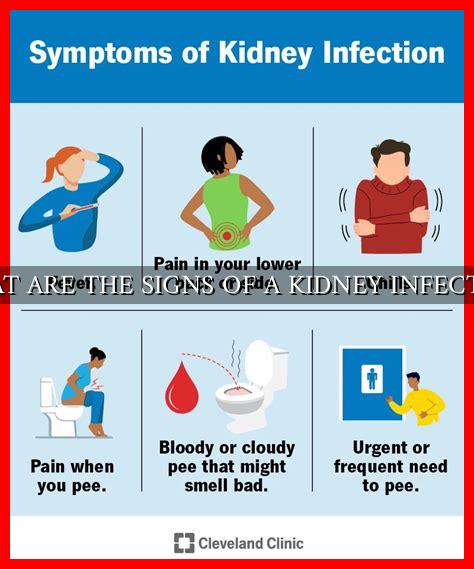-
Table of Contents
What Are the Signs of a Kidney Infection
A kidney infection, also known as pyelonephritis, is a serious condition that requires prompt medical attention. It occurs when bacteria infect the kidneys, leading to inflammation and potentially severe complications if left untreated. Recognizing the signs of a kidney infection is crucial for early diagnosis and effective treatment. In this article, we will explore the common symptoms and indicators of a kidney infection.
Symptoms of a Kidney Infection
The signs of a kidney infection can vary from person to person, but some common symptoms include:
- Fever and chills
- Pain in the back, side, or groin
- Frequent urination
- Blood in the urine
- Nausea and vomiting
- Fatigue and weakness
If you experience any of these symptoms, especially if they are persistent or severe, it is important to seek medical attention promptly. A kidney infection can lead to serious complications, such as sepsis or kidney damage, if not treated promptly.
Diagnosis and Treatment
Diagnosing a kidney infection typically involves a physical examination, urine tests, and possibly imaging tests such as a CT scan or ultrasound.
. Treatment usually involves antibiotics to clear the infection and relieve symptoms. In severe cases, hospitalization may be necessary for intravenous antibiotics and monitoring.
Risk Factors for Kidney Infections
Several factors can increase the risk of developing a kidney infection, including:
- Urinary tract infections (UTIs)
- Structural abnormalities in the urinary tract
- Being female, as women are more prone to UTIs
- Having a weakened immune system
- Using a catheter
It is essential to be aware of these risk factors and take steps to prevent kidney infections, such as staying hydrated, practicing good hygiene, and seeking prompt treatment for UTIs.
Preventing Kidney Infections
There are several ways to reduce the risk of developing a kidney infection:
- Drink plenty of water to stay hydrated
- Urinate frequently and completely to flush out bacteria
- Practice good hygiene, especially after using the bathroom
- Avoid holding in urine for long periods
- Seek prompt treatment for UTIs
By following these preventive measures, you can lower your risk of developing a kidney infection and maintain good kidney health.
Conclusion
Recognizing the signs of a kidney infection is crucial for early diagnosis and treatment. If you experience symptoms such as fever, back pain, or frequent urination, it is essential to seek medical attention promptly. By understanding the risk factors and taking preventive measures, you can reduce your chances of developing a kidney infection and maintain optimal kidney health.
For more information on kidney infections and their symptoms, visit the National Kidney Foundation website.





